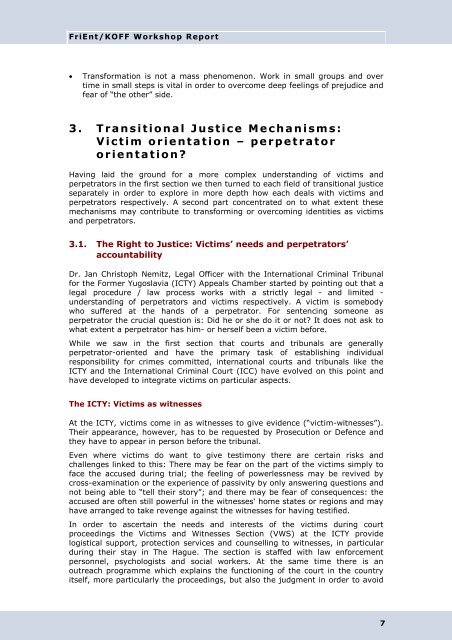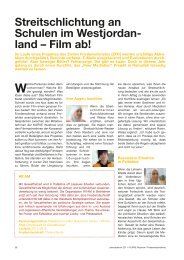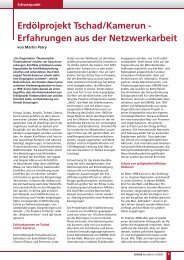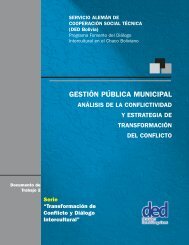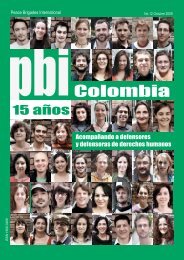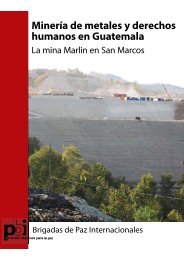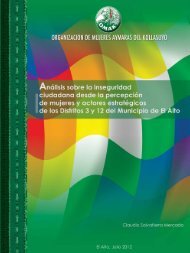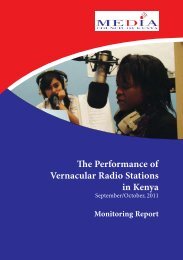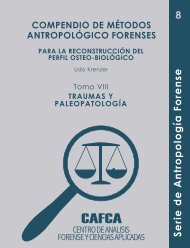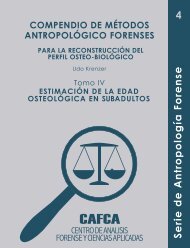Engaging with Victims and Perpetrators in Transitional ... - FriEnt
Engaging with Victims and Perpetrators in Transitional ... - FriEnt
Engaging with Victims and Perpetrators in Transitional ... - FriEnt
- No tags were found...
Create successful ePaper yourself
Turn your PDF publications into a flip-book with our unique Google optimized e-Paper software.
<strong>FriEnt</strong>/KOFF Workshop Report• Transformation is not a mass phenomenon. Work <strong>in</strong> small groups <strong>and</strong> overtime <strong>in</strong> small steps is vital <strong>in</strong> order to overcome deep feel<strong>in</strong>gs of prejudice <strong>and</strong>fear of “the other” side.3 . T r a n s i t i o n a l J u s t i c e M e c h a n i s m s :V i c t i m o r i e n t a t i o n – p e r p e t r a t o ro r i e n t a t i o n ?Hav<strong>in</strong>g laid the ground for a more complex underst<strong>and</strong><strong>in</strong>g of victims <strong>and</strong>perpetrators <strong>in</strong> the first section we then turned to each field of transitional justiceseparately <strong>in</strong> order to explore <strong>in</strong> more depth how each deals <strong>with</strong> victims <strong>and</strong>perpetrators respectively. A second part concentrated on to what extent thesemechanisms may contribute to transform<strong>in</strong>g or overcom<strong>in</strong>g identities as victims<strong>and</strong> perpetrators.3.1. The Right to Justice: <strong>Victims</strong>’ needs <strong>and</strong> perpetrators’accountabilityDr. Jan Christoph Nemitz, Legal Officer <strong>with</strong> the International Crim<strong>in</strong>al Tribunalfor the Former Yugoslavia (ICTY) Appeals Chamber started by po<strong>in</strong>t<strong>in</strong>g out that alegal procedure / law process works <strong>with</strong> a strictly legal - <strong>and</strong> limited -underst<strong>and</strong><strong>in</strong>g of perpetrators <strong>and</strong> victims respectively. A victim is somebodywho suffered at the h<strong>and</strong>s of a perpetrator. For sentenc<strong>in</strong>g someone asperpetrator the crucial question is: Did he or she do it or not? It does not ask towhat extent a perpetrator has him- or herself been a victim before.While we saw <strong>in</strong> the first section that courts <strong>and</strong> tribunals are generallyperpetrator-oriented <strong>and</strong> have the primary task of establish<strong>in</strong>g <strong>in</strong>dividualresponsibility for crimes committed, <strong>in</strong>ternational courts <strong>and</strong> tribunals like theICTY <strong>and</strong> the International Crim<strong>in</strong>al Court (ICC) have evolved on this po<strong>in</strong>t <strong>and</strong>have developed to <strong>in</strong>tegrate victims on particular aspects.The ICTY: <strong>Victims</strong> as witnessesAt the ICTY, victims come <strong>in</strong> as witnesses to give evidence (“victim-witnesses”).Their appearance, however, has to be requested by Prosecution or Defence <strong>and</strong>they have to appear <strong>in</strong> person before the tribunal.Even where victims do want to give testimony there are certa<strong>in</strong> risks <strong>and</strong>challenges l<strong>in</strong>ked to this: There may be fear on the part of the victims simply toface the accused dur<strong>in</strong>g trial; the feel<strong>in</strong>g of powerlessness may be revived bycross-exam<strong>in</strong>ation or the experience of passivity by only answer<strong>in</strong>g questions <strong>and</strong>not be<strong>in</strong>g able to “tell their story”; <strong>and</strong> there may be fear of consequences: theaccused are often still powerful <strong>in</strong> the witnesses‘ home states or regions <strong>and</strong> mayhave arranged to take revenge aga<strong>in</strong>st the witnesses for hav<strong>in</strong>g testified.In order to ascerta<strong>in</strong> the needs <strong>and</strong> <strong>in</strong>terests of the victims dur<strong>in</strong>g courtproceed<strong>in</strong>gs the <strong>Victims</strong> <strong>and</strong> Witnesses Section (VWS) at the ICTY providelogistical support, protection services <strong>and</strong> counsell<strong>in</strong>g to witnesses, <strong>in</strong> particulardur<strong>in</strong>g their stay <strong>in</strong> The Hague. The section is staffed <strong>with</strong> law enforcementpersonnel, psychologists <strong>and</strong> social workers. At the same time there is anoutreach programme which expla<strong>in</strong>s the function<strong>in</strong>g of the court <strong>in</strong> the countryitself, more particularly the proceed<strong>in</strong>gs, but also the judgment <strong>in</strong> order to avoid7


